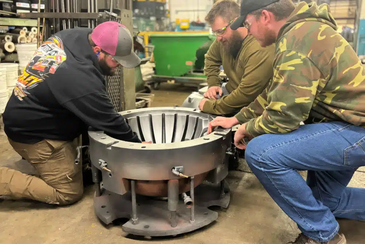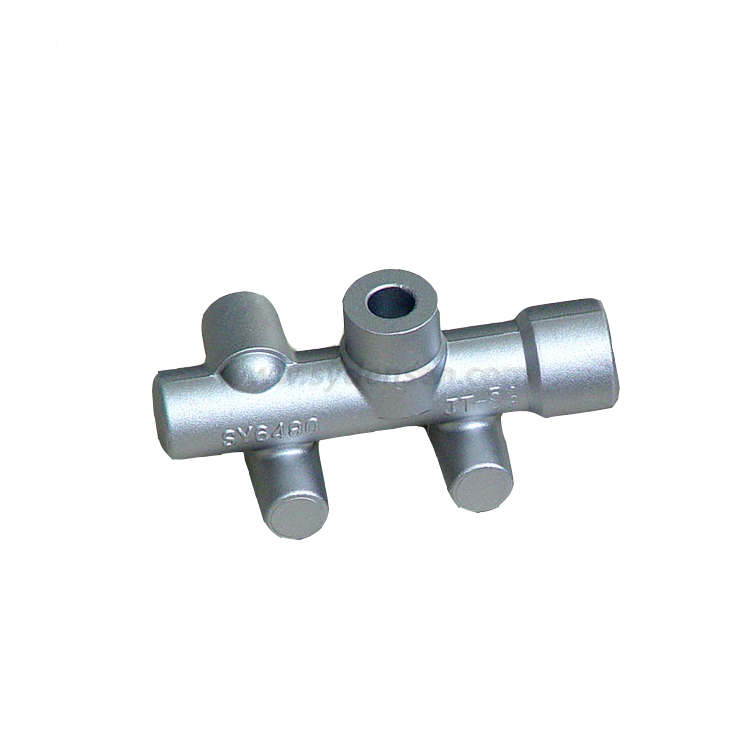The Future of Aluminum Foundries: Advancements and trends Forming the Sector
The aluminum foundry market is undergoing substantial change. Trick trends highlight the importance of sustainability and performance. Developments in clever manufacturing and automation are coming to be common. Shops are increasingly focused on utilizing recycled products. This shift raises concerns concerning future practices and technologies. Just how will these changes effect manufacturing methods and market dynamics? The responses might redefine the market landscape in unexpected methods.
Innovations in Smart Manufacturing Technologies
As the aluminum factory sector develops, innovations in smart manufacturing innovations are coming to be increasingly vital for boosting productivity and effectiveness. The assimilation of automation, artificial knowledge, and the Net of Points (IoT) is transforming standard foundry operations. These modern technologies make it possible for real-time surveillance of procedures, enabling for prompt adjustments that maximize output and decrease waste.
Furthermore, artificial intelligence formulas assess manufacturing information to recognize patterns and forecast upkeep requirements, decreasing downtime. Robotics are increasingly used for recurring jobs, releasing skilled workers to concentrate on more intricate obstacles. In addition, electronic doubles-- online models of physical procedures-- help with simulations that can improve design and functional methods.
The adoption of these clever manufacturing innovations is driving competitive benefits in the light weight aluminum foundry sector. By simplifying process and improving decision-making capabilities, factories can fulfill expanding market needs while keeping top notch criteria. The future of light weight aluminum foundries is unquestionably connected to these technical technologies.
Welcoming Eco-Friendly Products and Processes
The aluminum factory sector is progressively focusing on green materials and processes to improve sustainability. This shift includes the fostering of lasting material sourcing, energy-efficient production methods, and effective recycling and waste management approaches. By integrating these techniques, shops intend to reduce their environmental effect while preserving competition in the market.
Lasting Material Sourcing
How can aluminum factories improve their sustainability initiatives? Lasting material sourcing has actually emerged as a vital approach in attaining this objective. By focusing on recycled light weight aluminum, shops can considerably lower their environmental impact, as recycled products need less energy and fewer resources contrasted to key aluminum production. Additionally, sourcing products from certified distributors that abide by eco-friendly practices promotes responsible mining and minimizes eco-friendly influence. Shops are likewise discovering different products, such as biopolymers and green finishes, to enhance typical light weight aluminum procedures. Teaming up with stakeholders, consisting of vendors and environmental organizations, cultivates advancement in sourcing methods. Ultimately, welcoming sustainable material sourcing not only aligns with global sustainability objectives yet likewise settings aluminum foundries as leaders in ecologically responsible production.
Energy-Efficient Production Techniques
Light weight aluminum shops are significantly embracing energy-efficient production methods to match their sustainable material sourcing campaigns. These techniques concentrate on minimizing energy consumption throughout the production procedure. Advanced modern technologies, such as induction melting and maximized casting procedures, are being applied to minimize the general carbon footprint. In addition, automation and clever production systems improve functional efficiency, permitting far better power management. Factories are likewise exploring the integration of renewable power sources, such as solar and wind, to power their procedures. By prioritizing power effectiveness, aluminum factories not just lower manufacturing expenses but likewise align themselves with global sustainability objectives, ensuring a more eco responsible method to light weight aluminum production while meeting the increasing demand for environment-friendly methods in the market.
Recycling and Waste Administration
Accepting environment-friendly products and procedures, light weight aluminum shops are focusing on recycling and waste management methods to boost sustainability in their procedures. By integrating closed-loop systems, these facilities are minimizing waste and taking full advantage of source efficiency. Scrap aluminum, a conveniently offered material, is being recycled on-site, substantially reducing the requirement for virgin products and decreasing power consumption. Developments in sorting and refining technologies even more assist in the recycling of light weight aluminum, ensuring that even polluted materials can be repurposed successfully. In addition, shops are taking on lasting practices such as reducing dangerous waste and promoting the usage of naturally degradable products for product packaging. This commitment to recycling not only reduces environmental impact but also enhances the economic viability of aluminum shops in an affordable market.
The Role of Automation and Robotics
Automation and robotics are increasingly changing the light weight aluminum factory market, significantly enhancing production effectiveness. By integrating advanced technologies, shops can lower labor expenses while concurrently enhancing security criteria for their labor force. This shift not only streamlines procedures however additionally positions the industry for lasting development in a competitive market.
Enhanced Manufacturing Effectiveness
Changing manufacturing procedures, the assimilation of innovative robotics and automation innovations has actually become a keystone for light weight aluminum shops seeking boosted efficiency. These technologies simplify operations, minimize cycle times, and boost item high quality by lessening human error. Automated systems can check manufacturing lines in real-time, enabling instant adjustments that optimize result. Furthermore, robotics facilitate the handling of harmful products, making certain much safer workplace while boosting throughput. Anticipating maintenance modern technologies also add to effectiveness by preparing for equipment failings, thereby minimizing downtime. Because of this, light weight aluminum foundries can accomplish better consistency in their products while reacting extra swiftly to market needs. This embrace of automation is establishing a brand-new standard for efficiency and functional quality within the industry.

Lowering Labor Expenses
The shift towards advanced robotics and automation in light weight aluminum shops not just boosts manufacturing effectiveness however likewise plays a considerable function in minimizing labor expenses. By integrating automated systems, foundries can minimize the reliance on manual work, which often entails high incomes and training expenses. Robotics improve repetitive tasks such as putting, molding, and ending up, permitting a higher output with fewer employees. This technological change not just reduces labor-related costs but additionally enhances uniformity and top quality in manufacturing. Automation can run around the clock, optimizing functional hours without the connected costs of overtime or change differentials. Because of this, light weight aluminum factories can attain significant savings while maintaining competitive rates in a developing market landscape.
Improving Safety Specifications
While standard aluminum shop procedures commonly subject employees to hazardous settings, the combination of robotics and automation significantly boosts safety criteria within the industry. Automated systems can execute high-risk jobs, such as molten metal handling and hefty lifting, click to read decreasing human direct exposure to unsafe problems. In addition, robotics can operate in harmful environments and severe temperature levels, efficiently decreasing the threat of injury. Advanced checking technologies and expert system guarantee real-time security analyses, allowing for instant feedbacks to prospective threats. Furthermore, automation simplifies workflows, decreasing the probability of crashes caused by human error. Therefore, the fostering of these modern technologies not just improves safety however likewise promotes an extra reliable and effective workplace in light weight aluminum shops.
Enhancing Power Performance in Manufacturing
As light weight aluminum shops look for to maintain competitiveness in a developing market, boosting energy efficiency in production has actually arised as an essential focus. By adopting advanced technologies such as high-efficiency melting furnaces and automated temperature level controls, factories can significantly decrease energy usage. Applying real-time monitoring systems enables specific tracking of energy usage throughout the manufacturing process, allowing quick adjustments to maximize performance.
Furthermore, shifting to different power sources, including eco-friendly options, can even more reduce the carbon impact. The assimilation of power recovery systems, which recover waste warmth for reuse, is ending up being increasingly usual. Training workers in power management practices assures that everybody associated with the production procedure bears in mind power usage.
These campaigns not only reduced operational prices however also straighten with worldwide sustainability objectives, positioning light weight aluminum foundries as liable players in the sector while enhancing their general competition. - aluminum casting
Advancements in Recycling Light Weight Aluminum
Technologies in reusing light weight aluminum have gained momentum alongside efforts to improve energy effectiveness in manufacturing. The aluminum industry has welcomed innovative innovations that simplify the reusing procedure, decreasing power intake and ecological impact. Methods such click for more info as hydrometallurgy and brand-new sorting modern technologies boost the extraction of light weight aluminum from scrap, improving return prices and guaranteeing greater top quality recycled material.
Furthermore, the growth of closed-loop recycling systems allows factories to reuse light weight aluminum without substantial destruction in top quality, making the procedure more sustainable. Advancements in logistics and collection, including boosted monitoring systems and automated sorting, have actually likewise played a crucial duty in raising the performance of light weight aluminum healing. These improvements not just add to a round economic climate however likewise help mitigate the carbon impact connected with aluminum manufacturing. As the demand for sustainable techniques expands, these advancements position the aluminum foundry industry as a leader in accountable resource administration.
Replying To Market Demands and Consumer Trends
Flexibility has actually ended up being a cornerstone for aluminum foundries replying to developing market needs and customer trends. As industries progressively prioritize sustainability, aluminum shops are moving towards eco-friendly practices, consisting of enhanced reusing processes and reduced carbon impacts. This shift straightens with consumer preferences for environmentally accountable products, driving shops to innovate their offerings.
In addition, the increase of light-weight materials in auto and aerospace sectors demands developments in light weight aluminum alloys and casting techniques. Shops are spending in research and advancement to generate high-strength, lightweight elements that satisfy rigid performance requirements.
Personalization has actually gained grip, with consumers seeking tailored services. Light weight aluminum foundries are leveraging advanced production modern technologies, such as 3D printing, to accommodate certain client requirements effectively. This responsiveness not just pleases customer demands but likewise placements aluminum factories competitively in a vibrant market landscape, guaranteeing their importance in an ever-changing commercial environment.

Frequently Asked Questions
How Do Aluminum Foundries Influence Citizen Economies?
Light weight aluminum factories significantly impact local economic climates by producing tasks, stimulating demand for neighborhood distributors, and adding to neighborhood development. Their procedures usually result in increased tax obligation earnings, which can money vital public services and framework renovations.
What Are the Safety And Security Rules for Light Weight Aluminum Factory Employees?
Security policies for aluminum foundry employees consist visit this site of compulsory personal protective devices, proper air flow systems, regular training on unsafe materials, and adherence to guidelines established by work wellness and security managements to reduce risks and warranty worker safety and security. - Precision aluminum casting
Just How Does Aluminum Recycling Affect Global Supply Chains?
Light weight aluminum reusing significantly reduces demand for basic materials, enhances resource effectiveness, and supports prices. This shift impacts international supply chains by promoting a circular economic climate, promoting sustainability, and ensuring a more resistant market in varying markets.
What Job Opportunities Exist in the Light Weight Aluminum Factory Market?
Various career chances exist in the light weight aluminum shop industry, including roles in engineering, quality control, manufacturing administration, and study and development. Proficient labor settings such as mold makers and maker operators are likewise sought after.
Just How Do International Profession Policies Influence Light Weight Aluminum Foundries?
International trade policies substantially impact aluminum factories by impacting import tolls, supply chain characteristics, and market gain access to. These factors can affect operational costs, competitiveness, and overall earnings within the international light weight aluminum production landscape.
By focusing on recycled light weight aluminum, shops can substantially reduce their environmental impact, as recycled products call for much less power and less resources contrasted to main aluminum production. Aluminum foundries are increasingly taking on energy-efficient manufacturing strategies to match their lasting material sourcing efforts. Automation and robotics are progressively changing the light weight aluminum factory market, significantly improving manufacturing performance. The change in the direction of progressed robotics and automation in light weight aluminum shops not just boosts manufacturing effectiveness however likewise plays a considerable function in minimizing labor expenses. As light weight aluminum factories seek to keep competition in a progressing market, enhancing power effectiveness in production has actually emerged as an important emphasis.